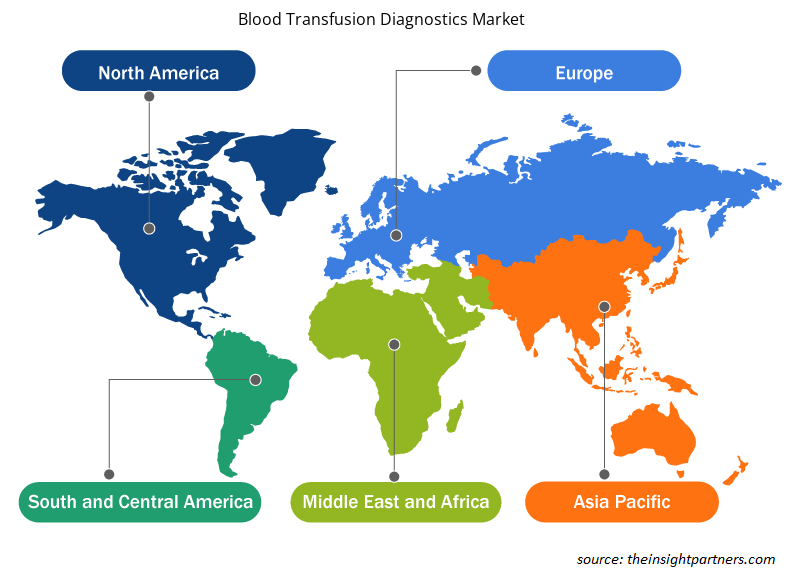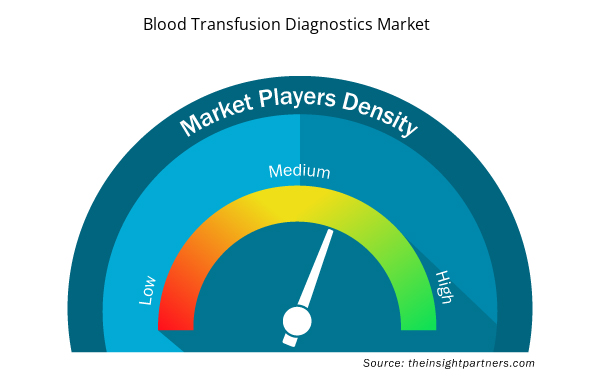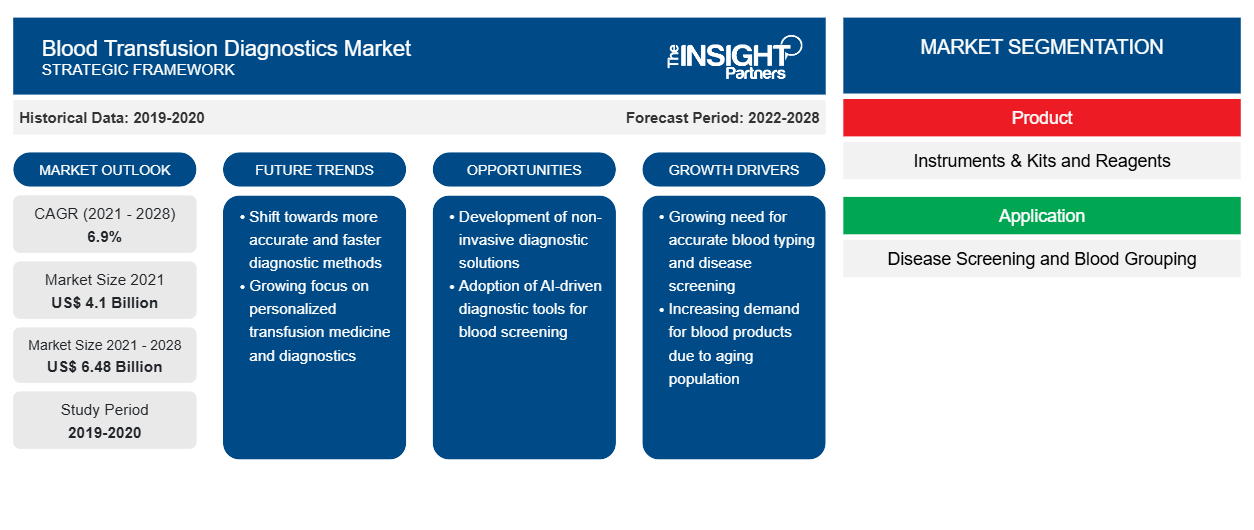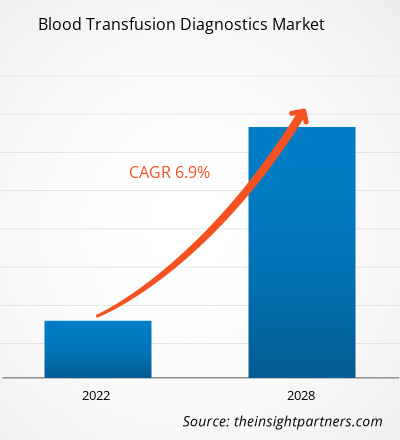[تقرير بحثي] من المتوقع أن ينمو سوق تشخيص نقل الدم من 4،096.93 مليون دولار أمريكي في عام 2021 إلى 6،483.75 مليون دولار أمريكي بحلول عام 2028. ومن المتوقع أن ينمو بمعدل نمو سنوي مركب قدره 6.9٪ من عام 2022 إلى عام 2028.
تشخيصات نقل الدم هي اختبارات يتم إجراؤها على الدم قبل نقله إلى المرضى. نقل الدم هو إجراء شائع يتم فيه نقل الدم المتبرع به أو مكوناته إلى جسم المريض من خلال طريق الحقن الوريدي. يجب أن تخضع كل وحدة من الدم لتصنيف الدم، والذي يشير إلى تحديد فصيلة الدم وفحص الدم، بما في ذلك اختبارات الكشف عن الأمراض لتجنب الآثار الجانبية أو انتقال العدوى.
يقدم التقرير رؤى وتحليلًا متعمقًا لسوق تشخيص نقل الدم العالمي ، مع التركيز على معايير مختلفة، بما في ذلك اتجاهات السوق والتقدم التكنولوجي وديناميكيات السوق وتحليل المنافسة للاعبين الرائدين في السوق العالمية. كما يتضمن تأثير جائحة COVID-19 على السوق في جميع المناطق. أثرت جائحة COVID-19 سلبًا على نمو سوق تشخيص نقل الدم العالمي. لقد أظهر انخفاضًا كبيرًا في الإيرادات بسبب القيود الصارمة التي فرضتها الحكومة مما أدى إلى انخفاض عدد العمليات الجراحية التي يتم إجراؤها. تُستخدم هذه الخدمات بشكل أساسي في العمليات الجراحية ذات فقدان الدم المرتفع، مثل جراحات العظام والقلب. بسبب انخفاض عدد العمليات الجراحية التي يتم إجراؤها، انخفض الطلب على نقل الدم. على سبيل المثال: وفقًا للبيانات التي نشرتها الجمعية الطبية الأمريكية، فقد قُدِّر أنه كان هناك انخفاض بنسبة 48٪ في إجمالي العمليات الجراحية التي أجريت في الولايات المتحدة بسبب جائحة COVID-19. ومع ذلك، بعد تطبيع قيود الوباء، عاد حجم العمليات الجراحية إلى مستوياته الطبيعية.
قم بتخصيص هذا التقرير ليناسب متطلباتك
ستحصل على تخصيص لأي تقرير - مجانًا - بما في ذلك أجزاء من هذا التقرير، أو تحليل على مستوى الدولة، وحزمة بيانات Excel، بالإضافة إلى الاستفادة من العروض والخصومات الرائعة للشركات الناشئة والجامعات
- احصل على أهم اتجاهات السوق الرئيسية لهذا التقرير.ستتضمن هذه العينة المجانية تحليلاً للبيانات، بدءًا من اتجاهات السوق وحتى التقديرات والتوقعات.
رؤى مبنية على الجغرافيا
من حيث الجغرافيا، يتم تقسيم سوق تشخيص نقل الدم العالمي إلى أمريكا الشمالية (الولايات المتحدة وكندا والمكسيك)، وأوروبا (فرنسا وألمانيا والمملكة المتحدة وإسبانيا وإيطاليا وبقية أوروبا)، وآسيا والمحيط الهادئ (الصين والهند واليابان وأستراليا وكوريا الجنوبية وبقية دول آسيا والمحيط الهادئ)، والشرق الأوسط وأفريقيا (المملكة العربية السعودية والإمارات العربية المتحدة وجنوب أفريقيا وبقية دول الشرق الأوسط وأفريقيا)، وأمريكا الجنوبية والوسطى (البرازيل والأرجنتين وبقية دول أمريكا الجنوبية والوسطى).
رؤى السوق
الحاجة إلى نقل الدم بسبب ارتفاع عمليات زراعة الأعضاء
زراعة الأعضاء هي عملية جراحية تُجرى في حالة فشل الأعضاء. عادةً ما تُجرى جراحات زراعة الأعضاء للقلب والكبد والكلى وأعضاء أخرى مختلفة بسبب ارتفاع حالات الأمراض المزمنة، مثل مرض الكلى المزمن (CKD)، ومرض الكلى المتعدد الكيسات، والتليف الكيسي، وأمراض القلب الخلقية، والتي تتطلب عمليات زرع. تستغرق هذه الإجراءات عادةً ساعات، وهناك الكثير من فقدان الدم وتتطلب الحاجة إلى نقل الدم. على سبيل المثال، وفقًا للشبكة المتحدة لمشاركة الأعضاء (UNOS)، زادت عمليات زراعة الأعضاء التي أجريت في الولايات المتحدة باستمرار، حيث أجريت أكثر من 41000 عملية زرع في عام 2021. وبالمثل، وفقًا لبيانات سجل زراعة الأعضاء العالمي، شكلت إسبانيا 20٪ من جميع التبرعات بالأعضاء في أوروبا في عام 2019 و6٪ في جميع أنحاء العالم. تحسن معدل التبرع بالأعضاء في أستراليا مؤخرًا، حيث ارتفع إلى 21.8 متبرعًا لكل مليون نسمة في عام 2019.
وعلى نحو مماثل، يبلغ عدد المتبرعين في كندا 22.2 لكل مليون نسمة، ويشهد هذا المعدل تحسناً مطرداً، ويعزى ذلك جزئياً إلى رقم "أطباء التبرع" ــ أطباء العناية المركزة المسؤولين عن التبرع بالأعضاء. ووفقاً لسجل زراعة الأعضاء العالمي، كان لدى الصين 5818 متبرعاً في عام 2019، أو 4.1 لكل مليون نسمة، وكان لدى الهند 715 متبرعاً، أو 0.5 لكل مليون نسمة في عام 2019. ومن ناحية أخرى، كان لدى روسيا معدل أعلى قليلاً بلغ 5.1 متبرعاً لكل مليون نسمة. وقد ساهمت الشراكة بين القطاعين العام والخاص، بالتعاون مع منسقي عمليات زراعة الأعضاء، بشكل كبير في تحسين عمليات زراعة الأعضاء التي تتطلب نقل الدم المستمر. وشهدت كل من البلدان النامية والمتقدمة زيادة في جراحات زراعة الأعضاء. على سبيل المثال، تبرز البلدان النامية، مثل الهند وسنغافورة، كوجهة للسياحة الطبية في منطقة آسيا والمحيط الهادئ. وتحرز البلدان تقدماً من حيث توفير علاجات طبية أفضل وأكثر تقدماً. والحاجة المتزايدة إلى عمليات زراعة الأعضاء من بين العوامل الرئيسية التي تدفع الطلب على تشخيصات نقل الدم في جميع أنحاء العالم.
رؤى قائمة على المنتج
بناءً على المنتج، ينقسم سوق تشخيص نقل الدم العالمي إلى أدوات ومجموعات وكواشف. في عام 2021، استحوذ قطاع الأدوات والمجموعات على حصة سوقية أكبر. ومن المتوقع أن يسجل نفس القطاع معدل نمو سنوي مركب أعلى في السوق من عام 2022 إلى عام 2028.
رؤى قائمة على التطبيق
بناءً على التطبيق، ينقسم سوق تشخيص نقل الدم العالمي إلى فحص الأمراض وتصنيف الدم. احتل قطاع فحص الأمراض حصة سوقية أكبر في عام 2021 ومن المتوقع أن يسجل معدل نمو سنوي مركب أعلى خلال الفترة المتوقعة.
رؤى إقليمية حول سوق تشخيص نقل الدم
لقد قام المحللون في Insight Partners بشرح الاتجاهات والعوامل الإقليمية المؤثرة على سوق تشخيص نقل الدم طوال فترة التوقعات بشكل شامل. يناقش هذا القسم أيضًا قطاعات سوق تشخيص نقل الدم والجغرافيا في جميع أنحاء أمريكا الشمالية وأوروبا ومنطقة آسيا والمحيط الهادئ والشرق الأوسط وأفريقيا وأمريكا الجنوبية والوسطى.

- احصل على البيانات الإقليمية المحددة لسوق تشخيص نقل الدم
نطاق تقرير سوق تشخيص نقل الدم
| سمة التقرير | تفاصيل |
|---|---|
| حجم السوق في عام 2021 | 4.1 مليار دولار أمريكي |
| حجم السوق بحلول عام 2028 | 6.48 مليار دولار أمريكي |
| معدل النمو السنوي المركب العالمي (2021 - 2028) | 6.9% |
| البيانات التاريخية | 2019-2020 |
| فترة التنبؤ | 2022-2028 |
| القطاعات المغطاة | حسب المنتج
|
| المناطق والدول المغطاة | أمريكا الشمالية
|
| قادة السوق وملفات تعريف الشركات الرئيسية |
|
كثافة اللاعبين في سوق تشخيص نقل الدم: فهم تأثيرها على ديناميكيات الأعمال
يشهد سوق تشخيص نقل الدم نموًا سريعًا، مدفوعًا بالطلب المتزايد من المستخدم النهائي بسبب عوامل مثل تفضيلات المستهلك المتطورة والتقدم التكنولوجي والوعي المتزايد بفوائد المنتج. ومع ارتفاع الطلب، تعمل الشركات على توسيع عروضها والابتكار لتلبية احتياجات المستهلكين والاستفادة من الاتجاهات الناشئة، مما يؤدي إلى زيادة نمو السوق.
تشير كثافة اللاعبين في السوق إلى توزيع الشركات أو المؤسسات العاملة في سوق أو صناعة معينة. وهي تشير إلى عدد المنافسين (اللاعبين في السوق) الموجودين في مساحة سوق معينة نسبة إلى حجمها أو قيمتها السوقية الإجمالية.
الشركات الرئيسية العاملة في سوق تشخيص نقل الدم هي:
- جريفولز، جنوب أفريقيا
- شركة ف. هوفمان-لاروش المحدودة
- شركة إيموكور
- مختبرات بيو راد المحدودة
- أبوت
إخلاء المسؤولية : الشركات المذكورة أعلاه ليست مرتبة بأي ترتيب معين.

- احصل على نظرة عامة على أهم اللاعبين الرئيسيين في سوق تشخيص نقل الدم
رؤى تعتمد على المستخدم النهائي
بناءً على المستخدم النهائي، يتم تقسيم سوق تشخيص نقل الدم العالمي إلى بنوك الدم والمستشفيات والمختبرات التشخيصية وشركات تجزئة البلازما . احتل قطاع بنوك الدم أكبر حصة في السوق في عام 2021. ومن المتوقع أن يسجل نفس القطاع أعلى معدل نمو سنوي مركب في السوق من عام 2022 إلى عام 2028.
يتبنى اللاعبون في سوق تشخيص نقل الدم العالمي استراتيجيات عضوية، بما في ذلك إطلاق المنتجات والتوسع فيها، لتوسيع نطاق وجودهم ومحفظة منتجاتهم في جميع أنحاء العالم وتلبية الطلب المتزايد. اللاعبون الرئيسيون في السوق هم Grifols، SA؛ F. Hoffmann-La Roche Ltd؛ Immucor، Inc.؛ Bio-Rad Laboratories، Inc.؛ Abbott؛ Thermo Fisher Scientific Inc.؛ Ortho Clinical Diagnostics؛ DiaSorin SpA؛ Quotient Limited؛ وBAG Diagnostics GmbH.
- التحليل التاريخي (سنتان)، السنة الأساسية، التوقعات (7 سنوات) مع معدل النمو السنوي المركب
- تحليل PEST و SWOT
- حجم السوق والقيمة / الحجم - عالميًا وإقليميًا وقطريًا
- الصناعة والمنافسة
- مجموعة بيانات Excel



Report Coverage
Revenue forecast, Company Analysis, Industry landscape, Growth factors, and Trends

Segment Covered
This text is related
to segments covered.

Regional Scope
North America, Europe, Asia Pacific, Middle East & Africa, South & Central America

Country Scope
This text is related
to country scope.
الأسئلة الشائعة
Global blood transfusion diagnostics market is segmented by region into North America, Europe, Asia Pacific, Middle East & Africa, and South & Central America. In North America, the U.S. is the largest market for blood transfusion diagnostics market. The growth of the market in North America is expected due to the factors such as increasing surgical procedures for chronic health conditions, rising collaborative agreements between key players, and growing progress in the health system for blood transfusion diagnostics. However, the improvement in blood transfusion management, increasing prevalence of sepsis and thalassemia, and the introduction of advanced molecular platforms are the key factor responsible for the Asia-Pacific regional growth for blood transfusion diagnostics accounting fastest growth of the region during the coming years.
Grifols, S.A.; F. Hoffmann-La Roche Ltd; DiaSorin S.p.A.; BAG Diagnostics GmbH; Abbott; Bio-Rad Laboratories, Inc.; Immucor, Inc.; Thermo Fisher Scientific Inc.; Ortho Clinical Diagnostics; and Quotient Limited are among the leading companies operating in the blood transfusion diagnostics market.
The blood banks segment dominated the global blood transfusion diagnostics market and accounted for the largest market share of 40.23% in 2021.
Based on application, disease screening segment took the forefront lead in the worldwide market by accounting largest share in 2021 and is expected to continue to do so till the forecast period.
Based on products, instruments and kits segment took the forefront lead in the worldwide market by accounting largest share in 2021 and is expected to continue to do so till the forecast period.
Blood transfusion diagnostics refers to tests performed on blood and blood components before they are transfused to patients. A blood transfusion is a common procedure in which donated blood or blood components are transfused into the patient's body through an intravenous line (IV). Each unit of blood must undergo blood typing, which refers to the identification of blood type and blood screening, including disease detection tests to avoid side effects or transmission of infection. Blood screening before transfusion is performed through instruments, kits, and reagents to identify various diseases, such as HIV, hepatitis B, hepatitis C, Zika, and different viruses and infections.
Rapid increase in chronic diseases and increasing need for blood transfusion due to rise in organ transplants surgeries are the most significant factors responsible for the overall market growth.
The List of Companies - Blood Transfusion Diagnostics Market
- Grifols, S.A.
- F. Hoffmann-La Roche Ltd
- Immucor, Inc.
- Bio-Rad Laboratories Inc.
- Abbott
- Thermo Fisher Scientific Inc.
- Ortho Clinical Diagnostics
- DiaSorin S.p.A.
- Quotient Limited
- BAG Diagnostics GmbH
The Insight Partners performs research in 4 major stages: Data Collection & Secondary Research, Primary Research, Data Analysis and Data Triangulation & Final Review.
- Data Collection and Secondary Research:
As a market research and consulting firm operating from a decade, we have published and advised several client across the globe. First step for any study will start with an assessment of currently available data and insights from existing reports. Further, historical and current market information is collected from Investor Presentations, Annual Reports, SEC Filings, etc., and other information related to company’s performance and market positioning are gathered from Paid Databases (Factiva, Hoovers, and Reuters) and various other publications available in public domain.
Several associations trade associates, technical forums, institutes, societies and organization are accessed to gain technical as well as market related insights through their publications such as research papers, blogs and press releases related to the studies are referred to get cues about the market. Further, white papers, journals, magazines, and other news articles published in last 3 years are scrutinized and analyzed to understand the current market trends.
- Primary Research:
The primarily interview analysis comprise of data obtained from industry participants interview and answers to survey questions gathered by in-house primary team.
For primary research, interviews are conducted with industry experts/CEOs/Marketing Managers/VPs/Subject Matter Experts from both demand and supply side to get a 360-degree view of the market. The primary team conducts several interviews based on the complexity of the markets to understand the various market trends and dynamics which makes research more credible and precise.
A typical research interview fulfils the following functions:
- Provides first-hand information on the market size, market trends, growth trends, competitive landscape, and outlook
- Validates and strengthens in-house secondary research findings
- Develops the analysis team’s expertise and market understanding
Primary research involves email interactions and telephone interviews for each market, category, segment, and sub-segment across geographies. The participants who typically take part in such a process include, but are not limited to:
- Industry participants: VPs, business development managers, market intelligence managers and national sales managers
- Outside experts: Valuation experts, research analysts and key opinion leaders specializing in the electronics and semiconductor industry.
Below is the breakup of our primary respondents by company, designation, and region:

Once we receive the confirmation from primary research sources or primary respondents, we finalize the base year market estimation and forecast the data as per the macroeconomic and microeconomic factors assessed during data collection.
- Data Analysis:
Once data is validated through both secondary as well as primary respondents, we finalize the market estimations by hypothesis formulation and factor analysis at regional and country level.
- Macro-Economic Factor Analysis:
We analyse macroeconomic indicators such the gross domestic product (GDP), increase in the demand for goods and services across industries, technological advancement, regional economic growth, governmental policies, the influence of COVID-19, PEST analysis, and other aspects. This analysis aids in setting benchmarks for various nations/regions and approximating market splits. Additionally, the general trend of the aforementioned components aid in determining the market's development possibilities.
- Country Level Data:
Various factors that are especially aligned to the country are taken into account to determine the market size for a certain area and country, including the presence of vendors, such as headquarters and offices, the country's GDP, demand patterns, and industry growth. To comprehend the market dynamics for the nation, a number of growth variables, inhibitors, application areas, and current market trends are researched. The aforementioned elements aid in determining the country's overall market's growth potential.
- Company Profile:
The “Table of Contents” is formulated by listing and analyzing more than 25 - 30 companies operating in the market ecosystem across geographies. However, we profile only 10 companies as a standard practice in our syndicate reports. These 10 companies comprise leading, emerging, and regional players. Nonetheless, our analysis is not restricted to the 10 listed companies, we also analyze other companies present in the market to develop a holistic view and understand the prevailing trends. The “Company Profiles” section in the report covers key facts, business description, products & services, financial information, SWOT analysis, and key developments. The financial information presented is extracted from the annual reports and official documents of the publicly listed companies. Upon collecting the information for the sections of respective companies, we verify them via various primary sources and then compile the data in respective company profiles. The company level information helps us in deriving the base number as well as in forecasting the market size.
- Developing Base Number:
Aggregation of sales statistics (2020-2022) and macro-economic factor, and other secondary and primary research insights are utilized to arrive at base number and related market shares for 2022. The data gaps are identified in this step and relevant market data is analyzed, collected from paid primary interviews or databases. On finalizing the base year market size, forecasts are developed on the basis of macro-economic, industry and market growth factors and company level analysis.
- Data Triangulation and Final Review:
The market findings and base year market size calculations are validated from supply as well as demand side. Demand side validations are based on macro-economic factor analysis and benchmarks for respective regions and countries. In case of supply side validations, revenues of major companies are estimated (in case not available) based on industry benchmark, approximate number of employees, product portfolio, and primary interviews revenues are gathered. Further revenue from target product/service segment is assessed to avoid overshooting of market statistics. In case of heavy deviations between supply and demand side values, all thes steps are repeated to achieve synchronization.
We follow an iterative model, wherein we share our research findings with Subject Matter Experts (SME’s) and Key Opinion Leaders (KOLs) until consensus view of the market is not formulated – this model negates any drastic deviation in the opinions of experts. Only validated and universally acceptable research findings are quoted in our reports.
We have important check points that we use to validate our research findings – which we call – data triangulation, where we validate the information, we generate from secondary sources with primary interviews and then we re-validate with our internal data bases and Subject matter experts. This comprehensive model enables us to deliver high quality, reliable data in shortest possible time.


 احصل على عينة مجانية لهذا التقرير
احصل على عينة مجانية لهذا التقرير